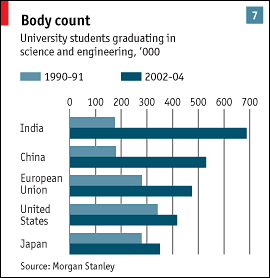More on Globalization
Today, Ed Sim refers to a recent article in the Wall Street Journal and another article in The Economist that both discuss the impact of globalisation and emerging economies on our lives.The Economist begins by stating:
Last year the combined output of emerging economies reached an important milestone: it accounted for more than half of total world GDP (measured at purchasing-power parity). This means that the rich countries no longer dominate the global economy. The developing countries also have a far greater influence on the performance of the rich economies than is generally realised. Emerging economies are driving global growth and having a big impact on developed countries' inflation, interest rates, wages and profits. As these newcomers become more integrated into the global economy and their incomes catch up with the rich countries, they will provide the biggest boost to the world economy since the industrial revolution.I couldn't agree with this more. But, on the same token, emerging markets can also now bring down the world economy just as quickly. So, this boost is not coming without strings attached. These are countries that lack infrastructure, have been historically fraught with corruption, and are controlled by small groups of self-interested individuals & families. The Economist does point this out later in the article, but doesn't stress this risk enough in my opinion.
Financial wobbles this summer acted as a reminder that emerging economies are more volatile than rich-country ones; yet their long-run prospects look excellent, so long as they continue to move towards free and open markets, sound fiscal and monetary policies and better education. Because they start with much less capital per worker than developed economies, they have huge scope for boosting productivity by importing Western machinery and know-how. Catching up is easier than being a leader. When America and Britain were industrialising in the 19th century, they took 50 years to double their real incomes per head; today China is achieving the same feat in nine years.Again, what China has gained in the past nine years could be lost within two if the capital markets lose faith in the economy & management over there. People, like the author of this essay, are quick to forget what happened in Argentina in 2002 or Russia in 1999, and countless other emerging economies in years past.
Michael Milken in the Wall Street Journal takes a different approach to the effects of globalisation:
As we start moving into our seventh decade, it's logical to ask what effect baby-boomer retirements will have on real estate and financial markets. The question is logical, but it puts the emphasis on the wrong side of the equation. The real future value of U.S. assets won't be determined by retirements, but by policy decisions on education, taxation, regulation, immigration, international investment and the environment. Baby boomer asset liquidation isn't really a financial market issue because (1) there's plenty of liquidity in the global economy; (2) as the rest of the world becomes wealthier, people outside the U.S. will own a greater percentage of global assets and they'll want to keep a share of their net worth in America; (3) liquidity will grow in both developed and developing nations as they adopt recent American financial innovations and market structures; (4) as baby boomers live longer and healthier, their new mantra will become "Who wants to retire?" and (5) most assets won't need to be sold.It's always amazing to me just how much influence both the rest of the world & our governments' foreign policies have on our future. In this flattened global economic realm, the mass movements of dollars and information across borders has more of an impact than we really realize. As I mentioned in a past post, Bret Swanson has pointed out that the price of oil has more to do with our weak dollar than it does with our trade relations or oil producers.
I definitely agree that as these emerging markets accumulate wealth, and we manage to continue to innovate & live ahead of the curve, America stands to benefit greatly from the investment of those countries in to our economy. However, therein is the crux of the challenge we face in this newly globalised society; that financial inflow can come and go just as freely. Open capital markets are a great thing, and so is the open dissemination of information, but being ahead of the curve in a constantly-equalizing market is the only way to sustain value.
And, the only way we can do this well over the long-term is by leading the pack in education. Something which we are clearly not doing right now. In his blog post, Ed Sim uploaded this graph along with others and commented:
In a world of pervasive communications, widespread information sharing, remote learning, and cheap transportation, it's becoming more and more clear (to me at least) that our only competitive advantages are our smarts & our creativity. Let's make sure we invest in these attributes so that we don't fall behind. Please. posted by Charles @ Thursday, September 21, 2006We have always thought of India and China as places to offshore low-level development work. Yes, alot of that has already been done but what is alarming is what may happen in the future as the comparative advantage that India and China have over us in terms of college graduates in science and math is overwhelming.
Not every one of those graduates according to the McKinsey Global Institute is up to par with the standards that we have in the U.S. (10% in China and 25% in India) but that is clearly changing.




0 Comments:
Post a Comment
<< Home